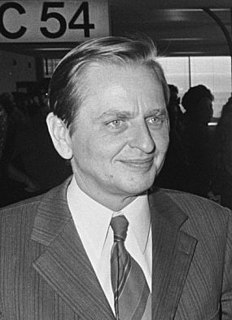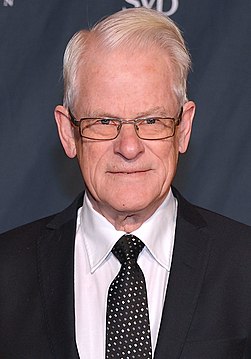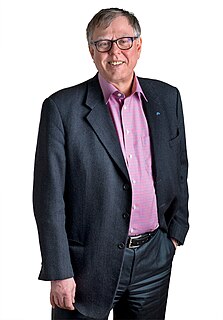
Sven Olof Joachim Palme was a Swedish Social Democratic politician and statesman. A longtime protégé of Prime Minister Tage Erlander, Palme led the Swedish Social Democratic Party from 1969 until his assassination in 1986, and was a two-term Prime Minister of Sweden, heading a Privy Council Government from 1969 to 1976 and a cabinet government from 1982 until his death. Electoral defeats in 1976 and 1979 marked the end of Social Democratic hegemony in Swedish politics, which had seen 40 years of unbroken rule by the party. While leader of the opposition, he parted domestic and international interests and served as special mediator of the United Nations in the Iran–Iraq War, and was President of the Nordic Council in 1979. He returned as Prime Minister after electoral victories in 1982 and 1985.

Gösta Ingvar Carlsson is a Swedish politician who twice served as Prime Minister of Sweden, first from 1986 to 1991 and again from 1994 to 1996. He was leader of the Swedish Social Democratic Party from 1986 to 1996. He is best known for leading Sweden into the European Union.

Dag Hjalmar Agne Carl Hammarskjöld was a Swedish economist and diplomat who served as the second Secretary-General of the United Nations. Hammarskjöld was the youngest person to have held the post, at an age of 47 years upon his appointment. His second term was cut short when he died in the crash of his DC-6 airplane while en route to cease-fire negotiations during the Congo Crisis. He is one of only four people to be awarded a posthumous Nobel Prize.

Engelbrekt Engelbrektsson was a Swedish rebel leader and later statesmen. He was the leader of the Engelbrekt rebellion in 1434 against Eric of Pomerania, king of the Kalmar Union.
John Kent Cooley was an American journalist and author who specialized in islamist groups and the Middle East. Based in Athens, he worked as a radio and off-air television correspondent for ABC News and was a long-time contributing editor to the Christian Science Monitor.
Craig Michael Williamson, is a former South African Police major, who was exposed as a spy in 1980, and was involved in a series of state-sponsored overseas bombings, burglaries, kidnappings, assassinations and propaganda during the apartheid era.

Per Evald Torbjörn Ohlsson is a Swedish journalist and author.

Torsten Olof "Olle" Fredrik Schmidt is a Swedish politician. He served as a Member of the European Parliament for the Swedish Liberal People's Party, part of the Alliance of Liberals and Democrats for Europe, between 1999 and 2004, and again between 2006 and 2014.
Until the late 2000s, terrorism in Sweden was not seen as serious threat to the security of the state. However, there has been a rise in far right and Islamist terrorist activity in the 21st century.
EUobserver is a European online newspaper, launched in 2000 by the Brussels-based organisation EUobserver.com ASBL.
Stephen Grey is a British investigative journalist and author best known for revealing details of the CIA's program of 'extraordinary rendition.' He has also reported extensively from the conflicts in Iraq and Afghanistan.
The Ebbe Carlsson scandal was a major political scandal in Sweden occurring during mid-1988. The affair came to public knowledge on 1 June 1988, when the evening newspaper Expressen revealed that Ebbe Carlsson, a journalist and publisher and former secretary at the Swedish Government, was carrying out an independent and illegal investigation into the assassination of prime minister Olof Palme, secretly supported by the minister for justice Anna-Greta Leijon.

Oliver Tickell is a British journalist, author and campaigner on health and environment issues, and author of the book Kyoto2 which sets out a blueprint for effective global climate governance. His articles have been published in all the broadsheet newspapers and numerous magazines including New Scientist, New Statesman and The Economist. He is an experienced broadcaster on the BBC home and world services including "Today", "PM", "Costing the Earth", "Farming World" and "Farming Today". He studied physics at Oxford University and is a founding fellow of the Green Economic Institute.

Mats Olof Foyer was the ambassador of the Kingdom of Sweden accredited to and resident in the People's Democratic Republic of Korea, a position he held 2005-2010.

Christian Palme is a Swedish communications expert, journalist and writer. He is a son of the late historian, professor Sven Ulric Palme and brother of professor emeritus Jacob Palme. His grandfather was the historian and right-wing activist Olof Palme (1884–1918).
The first cabinet of Ingvar Carlsson was the cabinet of Sweden between 12 March 1986 and February 1990. The cabinet was formed as a direct consequence of the assassination of the incumbent prime minister Olof Palme on 28 February 1986. After which the Speaker of the Parliament, Ingemund Bengtsson, in accordance with the Constitution of Sweden discharged all ministers.
Sweden-bashing is when Sweden is subjected to unfair criticism by non-Swedes that is either motivated by a desire for increased standing in their own home countries, or intended to influence Swedish government policies or social institutions.
Olof Oscar Hemberg (1881–1944) was a Swedish newspaper editor, writer and film producer. He has been credited with writing 21 films and producing eight films. Hemberg is best known for writing many screenplays for the director Schamyl Bauman including Witches' Night (1937) starring Gösta Ekman, På Solsidan for Gustaf Molander, starring Ingrid Bergman, and The Girls' Alfred (1935) for Edvin Adolphson, starring Sture Lagerwall. He also wrote the screenplay for the Danish film Idag Begynder Livet for Lau Lauritzen Jr. and Alice O'Fredericks. Furthermore, Hemberg produced several films for Gustaf Molander, including Paresiennes, and His English Wife, as well as Bara en danserska by Olof Molander.
Nils Erik Hjalmar Åhmansson, is a Swedish civil servant. Åhmansson was National Police Commissioner from 1 january 1988 to 20 October 1988. He was chairman of the Swedish Kennel Club from 1993 to 2015.

















